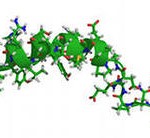WHAT IS NEUROPEPTIDE Y
NEUROPEPTIDE Y
A protein in the brain that makes you crave carbohydrates.
The part of the brain that controls your internal organs is called the hypothalamus. The hypothalamus works almost like a central dispatcher, receiving messages from your internal sense organs and then dispatching messages to other organs instructing them to behave in a certain way. For example, if the hypothalamus gets a message that your blood glucose level is too low, it sends a message to stimulate your appetite.All of these messages are sent via chemical messengers, and neuropeptide Y is one of these chemical messengers.
The hypothalamus controls many organs and bodily functions, and groups of nerve cells within the hypothalamus each have their own system to monitor. The group called the paraventricular nucleus (PVN), which produces neuropeptide Y, seems to be the hub of carbohydrate craving. Studies in animals have shown that the more neuropeptide Y the PVN produces, the more carbohydrate the animals eat. A similar situation is thought to exist in humans.
What chemical messenger would stimulate the PVN to produce neuropeptide Y? Probably the chemical by-products created when carbohydrates are burned as fuel. As these by-products build up, they send a chemical message that carbohydrate is used up. The PVN responds to that chemical message by pumping up neuropeptide Y production, making you hungry for carbohydrate.
Other factors may also increase neuropeptide Y levels and turn on carbohydrate craving. Stress, for instance, can increase your production of the “stress hormone” cortisol. The main function of cortisol appears to be that of a chemical messenger directing the body to replenish carbohydrate stores. It, too, instructs the PVN to pump up neuropeptide Y levels. Food depletion, caused by dieting or an overnight fast, and exercise also increase cortisol levels, which then increase neuropeptide Y levels, and ultimately bring on a craving for carbohydrate.
Just as these mechanisms stimulate the urge to eat carbohydrates, another mechanism appears to inhibit it. Under normal circumstances, eating carbohydrate leads the brain to increase production of serotonin, another chemical messenger. Rising serotonin levels signal the PVN to stop producing neuropeptide Y, thus turning off the carbohydrate craving. Pharmaceutical companies are eyeing a number of agents that mimic or enhance the action of serotonin as potential weight-loss drugs.
Diabetes may also have an effect on how much neuropeptide Y is produced and thus may cause people with diabetes to crave carbohydrate. Impaired glucose regulation reduces the availability of glucose, which can stimulate the PVN to produce neuropeptide Y. It has been shown, for instance, that animals with diabetes tend to have high levels of neuropeptide Y in the PVN.





